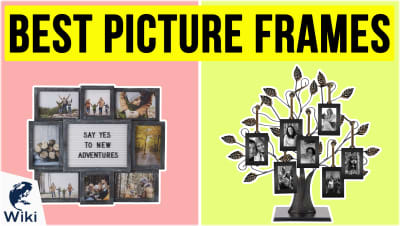11 Fascinating Books About Nature & The Environment
Whether you go hiking every weekend, speak out against the destruction of the environment, or just have an interest in this planet we all call home, reading up on nature and the environment can be an intriguing way to learn more about animals, climate, and conservation efforts. If that sounds interesting to you, then the eleven informative books listed below definitely belong on your shelf. This video was made with Ezvid Wikimaker.
11 Fascinating Books About Nature & The Environment
Products To Help You Go Green
If you're interested in the environment, you probably know that changing consumer habits is an important part of the fight against climate change. If you want to help save the planet, getting some of these eco-friendly products is a good place to start:
- A set of reusable grocery bags
- Stainless steel straws to replace disposable plastics
- A portable greenhouse where you can grow your own food
- Silicone food bags for taking healthy snacks on-the-go
- A vegan cookbook to help you cut back on meat
- Solar toys that will entertain your kids without using fossil fuels
- Some beeswax wraps, a waste-free way to keep food fresh
- A reusable water bottle
5 Human Impacts on the Environment
In Depth
Protecting nature is essential to our survival because the well-being of the environment directly affects the health of everyone and everything in it. If you're looking to stay informed about the many issues facing our planet, we've gathered eleven fascinating books about topics related to nature, listed in no particular order.
First up, at #1, we have "Wolf Nation" by Brenda Peterson, an informative and well-researched book about the history of wild wolves in America. Peterson aims to shine a spotlight on the reasons wolves have been hunted down to near extinction, and she also writes about Wolf Haven, a Washington-based sanctuary that aims to conserve and protect these animals.
Next, at #2, is "Voices of Resistance" by Derrick Jensen, a collection of essays about wildlife conservation. Jensen discusses several worldwide problems he believes need to be urgently addressed, such as climate change and the declining population of fish in the ocean, and he encourages readers to take a stand and raise awareness about these issues.
Jensen discusses several worldwide problems he believes need to be urgently addressed, such as climate change and the declining population of fish in the ocean, and he encourages readers to take a stand and raise awareness about these issues.
At #3 is "A Million Fragile Bones" by Connie May Fowler. In 2010, the Deepwater Horizon rig exploded and spilled millions of gallons of oil into the Mexican Gulf, affecting around 16,000 miles of coastline. In this memoir, Fowler writes about her time living in Alligator Point and how the oil spill directly affected her. It's a thought-provoking tale about the effects of environmental exploitation, and shows how a single disaster can ruin the lives of people and animals.
Next up, at #4, we have "Confessions of a Recovering Environmentalist." Written by Paul Kingsnorth, this collection of essays focuses on the environmentalist movement and how he thinks it has become a part of the problem. Arguing in favor of ecocentrism, he claims too much focus is being given to human needs, and that to properly address the issues faced by the planet, people have to stop relying on technology to save the world.
At #5 is "The Giant's Hand" by Nick Jans, which follows the author as he explores the harsh wilderness of northwest arctic Alaska. Along the way, he meets Inupiaq hunters, who tell him what it's like to live in an extremely cold and dangerous area where wild animals regularly pose a threat. It's an eye-opening story about survival and adventure, and Jans reflects on how the indigenous people in the area struggle to adjust to the rapidly changing climate.
Along the way, he meets Inupiaq hunters, who tell him what it's like to live in an extremely cold and dangerous area where wild animals regularly pose a threat.
Next, at #6, is "The Tangled Tree" by David Quammen. Quammen provides an in-depth look at the history of molecular phylogenetics, a branch of phylogeny that allows us to study evolution through the analysis of DNA and RNA. Citing the discoveries of other scientists, such as Carl Woese and Lynn Margulis, the author sheds some light on the process of horizontal gene transfer, which explains how a small percentage of human genes are inherited via viral infection.
Next, at #7, is "Horizon" by Barry Lopez. From Western Oregon all the way to Antarctica, the author documents his journey across the world as he reflects on humanity's impact on the planet and how his encounters with other people leave him hopeful for the future. Along the way, he befriends locals, scientists, and even artists whose enlightening stories will teach readers more about natural history and the animals that live in the wild.
At #8 is "The Hour of Land." Written by Terry Tempest Williams, it's a tribute to the national parks of America, twelve of which she visits and describes in great detail, discussing both the history and importance of each. Towards the end, she also reflects on the dangerous effects that environmental exploitation and climate change have on these parks and the world in general, citing incidents such as the tragic BP oil spill of 2010.
Written by Terry Tempest Williams, it's a tribute to the national parks of America, twelve of which she visits and describes in great detail, discussing both the history and importance of each.
Next, at #9, is "The Poisoned City" by Anna Clark. The Flint Water Crisis, which began in early 2014, exposed thousands of Michigan residents to contaminated drinking water. Clark recounts the events leading up to and after the state government's decision to cut costs by switching water sources, which led to the corrosion of the city's pipes and leading to adverse health effects for so many.
At #10 is "Seeds of Hope" by Jane Goodall with Gail Hudson. Renowned English naturalist Jane Goodall shares her love for nature and writes about the many types of plants and the important role they all play in our world. She also expresses her worries regarding industrialization and GMOs, but she remains hopeful for the future, citing the efforts of fellow naturalists and seed banks all around the world.
Finally, at #11, we have "Vitamin N" by Richard Louv, a guide for both adults and children that describes how connecting with nature can help improve one's physical and mental health. Louv provides over 500 activities that people can incorporate into their lives, such as planting trees and going on outdoor adventures, in order to take advantage of nature's benefits and make the world a better place.

















